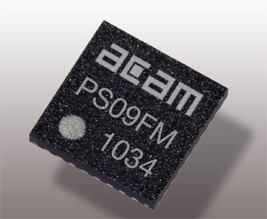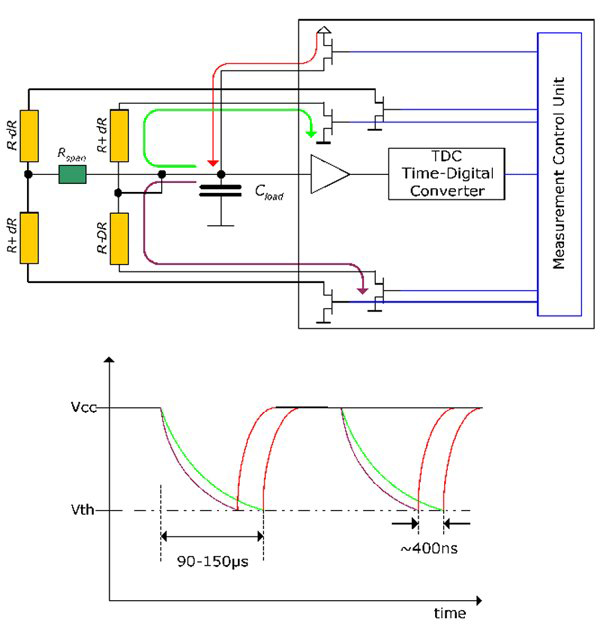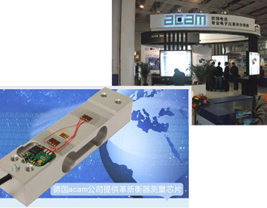Picostrain Strain Gage Circuits
PicoStrain Strain Gauge Sensors
Strain gauge measurement is one of the big challenges for sensor technology, especially the weighing industry. Due to the small excitation of the strain gauges on a load cell of only 0.2 % (2000 ppm) full scale,
and due to the high resolution of 16 Bit and more, the resistors must be measured with a precision deeply in the ppb range. Reasonably, this can only be done measuring the ratio of the resistors.
Here the PICOSTRAIN measuring principle is breaking new grounds compared to A/D converters. The ratio of the resistors is ascribed to a time interval measurement, not to a voltage difference like in Wheatstone bridges. The strain gauge sensor’s resistors together with a capacitor act as low-pass filters. The capacitor, charged to Vcc, and is discharged through the sensor’s resistors. The discharge time to trigger level (selectable) is precisely measured by a TDC (Time-to-Digital Converter).
PicoStrain: Strain Gauge / Load Cells
PicoStrain Applications
Load Cells, Torque Wrenches, Solar Scales, Kitchen Scales, Pressure Transducers
General Circuit Features
The PICOSTRAIN strain gauge sensor’s integrated circuits are realized without any analog component. Again, ScioSense (formerly acam) uses its TDC technology to set new standards in circuit design and takes the advantages of this principle like:
- No elaborate supply of the strain gage
- No need for a full-bridge, 2 resistors (half-bridge) are sufficient
- Reduction of the current into the strain gage (total system current down to a few µA)
- Easy temperature compensation
- No reference voltage
- Flexibility in update rate, precision and current consumption
- Wide temperature range up to process limits
Contact us to learn more about our strain gauge technology today.
Additional Information
Documentation & Downloads
Datasheet
 |
DescriptionDatasheet PS09 Vol. 2: |
Version |
Size |
Download |
 |
DescriptionDatasheet PS09 Vol. 1: |
Version |
Size |
Download |
 |
Description |
Version |
Size |
Download |
Description |
Version |
Size |
Download |
 |
Description |
Version |
Size |
Download |
DescriptionDatasheet PS081: Enhanced Single-chip solution for weigh scales |
Version |
Size |
Download |
 |
Description |
Version |
Size |
Download |
 |
Description |
Version |
Size |
Download |
 |
Description |
Version |
Size |
Download |
Application Notes
 |
DescriptionApplication Note 030: |
Version |
Size |
Download |
 |
DescriptionApplication Note 025: |
Version |
Size |
Download |
 |
DescriptionApplication Note 023: |
Version |
Size |
Download |
 |
DescriptionApplication Note 022: |
Version |
Size |
Download |
 |
DescriptionApplication Note 021: |
Version |
Size |
Download |
 |
DescriptionApplication Note 018: |
Version |
Size |
Download |
 |
DescriptionApplication Note 012: |
Version |
Size |
Download |
 |
Description |
Version |
Size |
Download |
White Papers
 |
DescriptionWhite Paper 004: |
Version |
Size |
Download |
 |
DescriptionWhite Paper 003: |
Version |
Size |
Download |
 |
DescriptionWhite Paper 002: |
Version |
Size |
Download |
 |
DescriptionWhite Paper 001: |
Version |
Size |
Download |
Screencasts
 |
DescriptionScreencasts PS09: |
Version |
Size |
Download |
 |
DescriptionScreencasts PS09: |
Version |
Size |
Download |
 |
DescriptionScreencasts PS09: |
Version |
Size |
Download |
 |
DescriptionScreencasts PS081/PS09: |
Version |
Size |
Download |
 |
DescriptionScreencasts PS08/PS081: |
Version |
Size |
Download |
 |
DescriptionScreencasts PS08-EVA-KIT: |
Version |
Size |
Download |
Software
 |
Description |
Version |
Size |
Download |
 |
Description |
Version |
Size |
Download |
 |
Description |
Version |
Size |
Download |
 |
Description |
Version |
Size |
Download |
 |
DescriptionSoftware National Instruments: |
Version |
Size |
Download |
 |
DescriptionSoftware National Instruments: |
Version |
Size |
Download |
 |
DescriptionSoftware National Instruments: |
Version |
Size |
Download |
Datasheet
 |
DescriptionDatasheet PS09 Vol. 2: |
Version |
Size |
Download |
 |
DescriptionDatasheet PS09 Vol. 1: |
Version |
Size |
Download |
 |
Description |
Version |
Size |
Download |
Description |
Version |
Size |
Download |
 |
DescriptionDatasheet PS081 Eval System: |
Version |
Size |
Download |
DescriptionDatasheet PS081: Enhanced Single-chip solution for weigh scales |
Version |
Size |
Download |
 |
Description |
Version |
Size |
Download |
 |
Description |
Version |
Size |
Download |
 |
Description |
Version |
Size |
Download |
Application Notes
 |
DescriptionApplication Note 030: |
Version |
Size |
Download |
 |
DescriptionApplication Note 025: |
Version |
Size |
Download |
 |
DescriptionApplication Note 023: |
Version |
Size |
Download |
 |
DescriptionApplication Note 022: |
Version |
Size |
Download |
 |
DescriptionApplication Note 021: |
Version |
Size |
Download |
 |
DescriptionApplication Note 018: |
Version |
Size |
Download |
 |
DescriptionApplication Note 012: |
Version |
Size |
Download |
 |
Description |
Version |
Size |
Download |
White Papers
 |
DescriptionWhite Paper 004: |
Version |
Size |
Download |
 |
DescriptionWhite Paper 003: |
Version |
Size |
Download |
 |
DescriptionWhite Paper 002: |
Version |
Size |
Download |
 |
DescriptionWhite Paper 001: |
Version |
Size |
Download |
Screencasts
 |
DescriptionScreencasts PS09: |
Version |
Size |
Download |
 |
DescriptionScreencasts PS09: |
Version |
Size |
Download |
 |
DescriptionScreencasts PS09: |
Version |
Size |
Download |
 |
DescriptionScreencasts PS081/PS09: |
Version |
Size |
Download |
 |
DescriptionScreencasts PS08/PS081: |
Version |
Size |
Download |
 |
DescriptionScreencasts PS08-EVA-KIT: |
Version |
Size |
Download |
Software
 |
Description |
Version |
Size |
Download |
 |
Description |
Version |
Size |
Download |
 |
Description |
Version |
Size |
Download |
 |
Description |
Version |
Size |
Download |
 |
DescriptionSoftware National Instruments: |
Version |
Size |
Download |
 |
DescriptionSoftware National Instruments: |
Version |
Size |
Download |
 |
DescriptionSoftware National Instruments: |
Version |
Size |
Download |
PicoStrain Measurement Principle
 The capacitor is charged to the supply voltage and then discharged through one of the SG resistors. The discharge time down to an arbitrary trigger level is measured with ultra-high precision using a TDC (Time-to-Digital Converter). The discharge time is in the range 100 µs. The TDC unit used have a typical single-shot resolution of less than 20 ps.
The capacitor is charged to the supply voltage and then discharged through one of the SG resistors. The discharge time down to an arbitrary trigger level is measured with ultra-high precision using a TDC (Time-to-Digital Converter). The discharge time is in the range 100 µs. The TDC unit used have a typical single-shot resolution of less than 20 ps.
This measuring process is repeated in time-multiplex with both resistors of a half-bridge, using the same capacitor and the same comparator. Calculating the ratio of the results will turn out the absolute values and temperature dependencies of the capacitor and the comparator.
Additional patented circuits and algorithms inside the products compensate for further error sources like the switch-on resistance of the output drivers (Rdson) and the propagation delay of the comparator. The result is very precise, nearly free of gain errors and very stable with temperature. In total each single measurement is made of 8 discharge/charge cycles to solve this compensation task.
Due to the measuring principle, does not need a full-bridge but a half-bridge is sufficient. The supply of the half-bridge is provided directly by the circuits. There is no need for a separate supply of the SG. Also the reference voltage is not required.
Thanks to the pulsed drive easily controls the current through the whole system and, even more important, reduces the current consumption to re-markably less than comparable ADC systems.
The measuring principle is showing a new approach to strain gage (SG) measurement. Contrary to the Wheatstone bridge, where the variation of resistance is transformed into a variation of voltage, solutions transfer it into a high-precision time interval measurement. For this purpose the SG resistors are connected to a capacitor, forming a low-pass filter.
Measurement Principle

PicoStrain Background : Measurement Task
Metal strain gages (SG) change their value with mechanical deformation, especially a variation in length. The strain e designates the relative variation in length of the SG:
Strain (e) = dL/L
Common SG have a maximum strain of typical
e(max) = 1000 µ (1000 x 10-6 or 0.1 %).
The ratio of the resistance variation to the length variation is designated K-factor or strain gain.
dR/R = K x dL/
For metal SG the K-factor is typically of value 2. The maxim variation of the SG resistance is then given as:
dR(max)/R = e(max) x K = 2000 ppm
If the SG is connected in the manner of a Wheatstone bridge, this corresponds to a maximum signal output voltage of 2 mV/V. The resistance of common metal strain gauges is typically 350 Ohm or 1000 Ohm. The maximum variation in resistance and therefore the effective measurement range is within 0.7 Ohm to 2 Ohm. This small variation must be resolved according to the measurement task. The range of the resolution needed is very wide. It is between 10 ENOB (e.g. for pressure sensors) and 18 ENOB (e.g. calibrated scales). In the upper range the precision of the measurement has to be:
Resolution : 2000 ppm/218 = 0.008 ppm eff.
or 26.9 ENOB referenced to the full resistance.
The typical measurement rates are in between
2 – 8 Hz (e.g. scales) and
4 – 10 kHz (e.g. fast pressure sensors).
PicoStrain Advantages
 Advantage 1
Advantage 1
Extremely low current consumption for your complete bridge sensor system
The ultra-low power PICOSTRAIN measuring principle shows an extremely low overall current consumption of the total system. It is possible to reduce the power consumption by a factor 10 to 20 compared to conventional AD-Converter solutions.
Advantage 2
One solution suits to (nearly) all applications, from low cost up to highest precision
PICOSTRAIN allows to build systems with 1.500 … 150,000 peak to peak divisions (at 2 mV/V strain) and update rates up to 1 kHz. One and the same chip covers the requirements of many applications, just by variation of your software.
Advantage 3
Reduced overall system costs
PICOSTRAIN reduces or saves the costs of the power supply. Power plugs will be replaced by batteries, batteries will be reduced in size. In many applications a single coin cell battery may last for 10 years under normal operation. The number of external components is far below the usual.
Advantage 4
New products that could not be done up to now
There are new product options mainly due to the low current consumption and low operating voltage. First to mention are solar driven applications. Also 1.55 V silver-oxide batteries are possible although with some restrictions (e.g. re-programming). The measurement quality is impressive even at those low voltages and it might be difficult to find something comparable in the market.
Advantage 5
Improve your Quality and lower your production cost
PICOSTRAIN offers unique possibilities to simplify the production of your bridge sensor and to improve its quality. The bridge offset can be simply adjusted by setting a register, gain drift can be reduced through software correction of Rspan. This method is more precise than with standard solutions. At the same time costly mechanical trimming, wich is still common practice, becomes redundant
Ordering Numbers
Type |
Part Number |
Package |
RoHS Compl. |
Shipping Package |
| PS09 | MNR 1783 | Dice | Yes | Waffle pack |
| PS09FN | MNR 1840 | QFN40 | Yes | |
| PS09-EVA-KIT | MNR 1785 | PCB | Yes | |
| PS09-DLC-EVA | MNR 1927 | PCB | Yes | |
| PS081 | MNR 1615 | Dice | Yes | Waffle pack |
| PS081FN | MNR 1612 | QFN56 | Yes | |
| PS081-EVA-KIT | MNR 1525 | PCB | Yes | |
| PicoProg Uni System V2.0 | MNR 1723 | PCB | Yes |
Ordering Numbers
Type |
Part Number |
Package |
RoHS Compl. |
Shipping Package |
| PS09 | MNR 1783 | Dice | Yes | Waffle pack |
| PS09FN | MNR 1840 | QFN40 | Yes | |
| PS09-EVA-KIT | MNR 1785 | PCB | Yes | |
| PS09-DLC-EVA | MNR 1927 | PCB | Yes | |
| PS081 | MNR 1615 | Dice | Yes | Waffle pack |
| PS081FN | MNR 1612 | QFN56 | Yes | |
| PS081-EVA-KIT | MNR 1525 | PCB | Yes | |
| PicoProg Uni System V2.0 | MNR 1723 | PCB | Yes |
